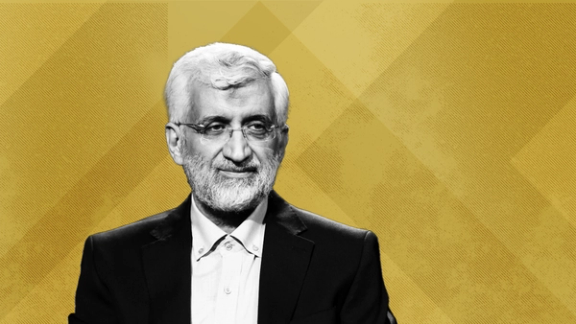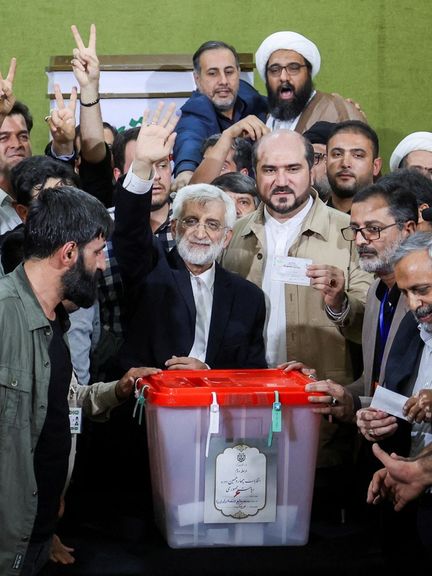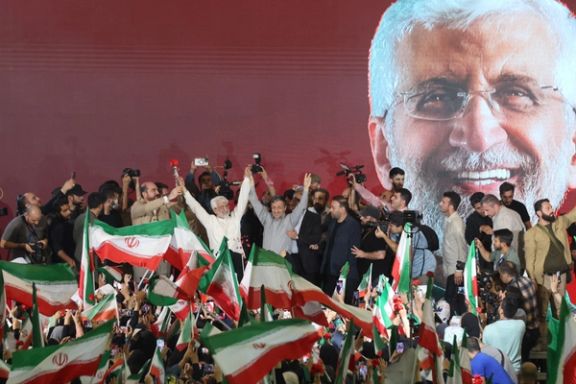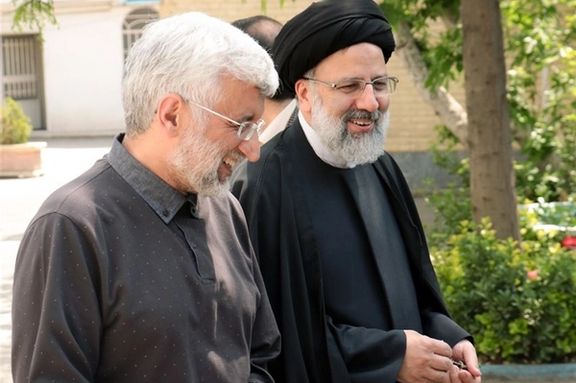Shadow government sparks fierce debate in post-election Iran

In the aftermath of Masoud Pezeshkian’s victory in the Iranian presidential election, talk of a shadow government by his hardliner rival Saeed Jalili has sparked intense debate.

In the aftermath of Masoud Pezeshkian’s victory in the Iranian presidential election, talk of a shadow government by his hardliner rival Saeed Jalili has sparked intense debate.
Critics question the legitimacy and funding of Jalili’s self-styled oversight body, challenging its alignment with the late president Ebrahim Raisi’s administration and highlighting the broader political rift within the country.
What constitutes a shadow government?
A select number of countries, including Canada, Australia, and the United Kingdom, implement the shadow government system. According to the British Parliament, each shadow cabinet member is tasked with leading a specific policy area and challenging their government counterpart. This structure allows the official opposition to position itself as an alternative government-in-waiting.
What, then, would be considered a shadow government in Iran?
In Iran, a shadow government is not a legal or traditional concept.
Jalili uses the term, but his interpretation deviates from the international concept. First, Jalili does not represent an opposition party, as he is not affiliated with any. The Paydari Party endorses him, although he is not a member himself. Second, his interpretation extends beyond the government to encompass the entire state apparatus.

How does Jalili conceptualize a shadow government?
Jalili first broached the concept of forming a shadow government following the establishment of Hassan Rouhani's first administration in 2013.
According to his official website, his shadow government comprises a series of trips, meetings, and working groups aimed at "formulating step-by-step actions on fundamental economic, managerial, political, and cultural issues."
Jalili articulated the notion as “a discourse and a movement,” asserting that “anyone in society who feels a responsibility for the country's trajectory, the revolution, and various issues should meticulously monitor developments to the best of their ability and endeavor to exert a positive influence.”

He also stressed that it is not limited to the executive branch but includes the legislature, and judiciary.
During his presidential campaign in 2024, Jalili revealed the extensive scale of his shadow government, which he described as comprising “over a thousand managers and experts dedicated to meticulously monitoring national issues and formulating innovative solutions.”
He further noted that, under this initiative, he has personally undertaken more than 140 trips to various regions nationwide.
What criticisms are levied against Jalili's shadow government?
Interestingly, Supreme Leader Ali Khamenei was among the first to oppose Jalili's efforts.
“The relevant officials should undertake the work themselves. Parallel work alongside the government apparatus is not successful. This has been my definitive experience over the years,” Khamenei said in 2018.

When Jalili initially introduced the concept during Rouhani's tenure, critics asserted that his primary objective was to "obstruct" the nuclear negotiations conducted under Rouhani's administration. A fervent critic of Tehran's 2015 nuclear agreement with major powers, Jalili had previously served as Iran's chief nuclear negotiator from 2007 to 2012. During his tenure, Tehran adopted a defiant and unyielding stance in negotiations with global powers over its uranium enrichment program. This period saw the imposition of three UN Security Council resolutions on Iran, with multiple attempts to resolve the conflict proving unsuccessful.
After Rouhani's tenure ended and hardliner Ebrahim Raisi assumed office, Jalili's shadow government made no significant public statements. However, during the recent presidential elections, as Jalili touted "plans derived from the experience of the shadow government," other candidates began to criticize him.
Among the critics was Mostafa Pourmohammadi, a presidential candidate and former justice minister. He criticized Jalili by asserting that the activities of a shadow government do not constitute genuine action, emphasizing that only those initiatives conducted transparently and openly "in the light" genuinely matter, as opposed to those carried out "in the shadow."
Pezeshkian also emphasized that a clandestine shadow government is unlikely to significantly improve the country's citizens' lives. He also raised concerns regarding the funding for Jalili’s shadow cabinet.
"He should clarify the sources of the funds that enabled these experts to collaborate with him," Pezeshkian stated during a presidential debate for the runoff election. "Additionally, he should disclose the identities of these individuals compensated for their research efforts."

Following Pezeshkian's victory, numerous reformist media outlets and politicians raised concerns about the origins of the funds supporting Jalili's program. After Pezeshkian's election win, tensions escalated when Jalili met with him and expressed a willingness to collaborate with the new administration, provided it adhered to "revolutionary principles." Jalili also sternly warned that any deviations or errors would prompt decisive and forceful intervention on his part.
Mahmoud Vaezi, the former chief of staff to ex-president Rouhani, stated that it is “dangerous” for a failed candidate to claim he wants to form a shadow government.
“The question is, what authority does Jalili have to declare himself an arbiter of governance, saying he will intervene if Pezeshkian does not perform correctly? Many of Jalili's preferred policies face serious criticism from officials who do not endorse his proposed model,” Vaezi said on Saturday.
A reformist political activist, Ali Bagheri, also said that a shadow government requires transparency.
“What is the identity of this entity engaged in critiquing and reviewing the government while offering reform proposals? What is its legal status? From where does it derive its wealth and fund its operations?” Bagheri said on Saturday.
“It is a fundamental principle that anyone or any entity aspiring to position itself as a shadow government must first fully disclose its identity,” he added.
Former MP Esmail Gerami Moghadam remarked that the alignment of Jalili's shadow government with the late President Raisi's administration rendered its formation meaningless, given their shared hardline stance. He elaborated, "Fundamentally, a shadow government is intended for political parties. It is the parties that establish shadow governments." Moghadam observed that Jalili neither possesses nor plans to establish a party, prompting the inquiry, "Who has commissioned him to form a shadow government? Is it financed from his funds?"
One of the major criticisms came from Heshmatollah Falahatpisheh, former head of the Iranian Parliament's Foreign Policy Committee. He remarked, “The only things we have seen from the shadow government so far are obstructions in political and domestic issues, imposing significant costs on the country regarding the International Financial Task Force (FATF).”
The FATF is an international financial watchdog that spearheads efforts to combat money laundering, terrorist financing, and the financing of weapons proliferation. In recent years, Iran has been placed on the financial watchdog’s “blacklist” due to its failure to adhere to transparency standards and international conventions against money laundering and terrorism financing.
Saeed Jalili's resistance to adopting the Financial Action Task Force (FATF) recommendations had emerged as a pivotal topic in the sudden presidential election debates in Iran.
For more than a decade, the debate over FATF compliance, intertwined with the persistent challenge of international sanctions, has dominated Iran's foreign relations discourse.
During the presidential elections, Pourmohammadi disclosed that during a session at the Supreme National Security Council, Jalili admitted they were not adhering to FATF regulations to disrupt Rouhani's government.

Falahatpisheh criticized the shadow government, stating that if its outcome was the forfeiture of the opportunity to revive the JCPOA, entangling Iran in the Ukraine conflict, and placing Iran on the FATF list, then it has not served the nation. "In my view, it has never prioritized the interests of the Iranian people," he remarked. He further noted that forming a shadow government while an official administration is in office is futile and merely reflects the ambitions of certain individuals.
“A shadow government is for parliamentary systems, where a minority party forms a shadow cabinet to oversee the majority government, ready to take over if the majority government falls, similar to the Labour Party replacing the Conservative Party in the UK,” he added.
How has Jalili addressed his critics?
Jalili's response to his critics can be best encapsulated in his remarks on Saturday, where he dismissed the criticisms as unimportant.
He emphasized the importance of focusing on substantial tasks rather than minor issues. "They accuse and undermine us, but as much as possible, keep your eyes on the broader horizon," he stated. "Some may request responses to these minor issues; however, we don't have time for that. We have so much work to do, and if we focus on the big tasks, many of these issues will resolve themselves."